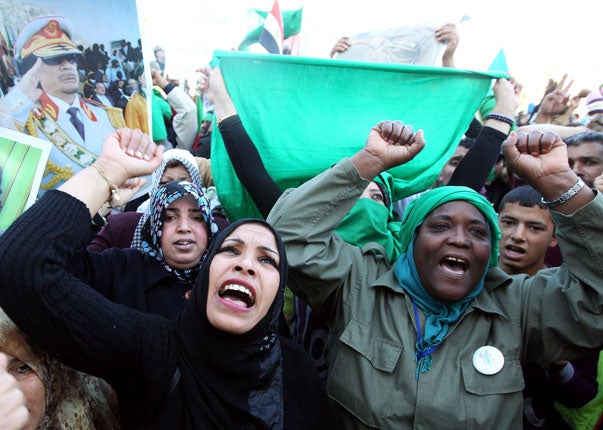Guarded by Gaddafi's men, we only glimpse the real Libya
The bombing has further reduced reporters' freedom in Tripoli

In any other context the children at Meethaq School would have been easily the best part: bright, friendly and interested in their visitors.
Shahad Abdel Hakim, 11, wanted to be a dentist – a popular profession in Libya by all accounts – when she grew up, as did her friend Asil Adelson, 12.
"Today is Child Day," explained a smiling Shahad. "We were going to have a party, but we had to put it off when some of the children didn't come to school because of the bombing."
As the visitors from the foreign press arrived, the pupils, in this classroom mainly aged between eight and 13, proudly brandished banners glorifying "Muammar our father" and a picture showing bombs falling out of aeroplanes, not to mention chanting at the top of their voices – with every sign of enthusiasm – the all-too-familiar chant of "Allah, Muammar, Libya: that's all you need."
Why did they think the bombing was happening? "For the oil." How often did they study the Leader's famous Green Book, or as it turns out a simplified version called Community? "One day a week." Did they ever want to travel out of Libya and see other countries? "No."
We shouldn't have expected more, of course. We had arrived with the ubiquitous government minders, the children were probably well schooled, and there was always going to be little or no chance to find the odd deviation from the official line – or even pupils happily immersed in maths, Arabic, English; anything that actually might have created a better impression of the Libyan education system.
Which is rather the point. It remains baffling that those behind the propaganda effort would think this trip to the southern Tripoli suburb of Sarraj would do anything other than convince those making it of the stultifying effects of 41 years of one man's rule.
That said, at least it got us out of the Rixos Hotel, albeit in the most constrained of circumstances. For yesterday was a day that "security" there – and that means stopping paying residents getting out at least as much as unwelcome visitors getting in – was tightened in earnest.
Despite the theoretical ban on travel even in the city without one of the minders, and not so theoretical given that it has been enforced at times by arrests and detentions of journalists, it had been possible up to now to slip away and catch a glimpse of another Tripoli. To amble along the charmingly dilapidated sea front on the edge of the old city, to have couscous at Zakafan, an amiable restaurant off Green Square, or to take a taxi to the outlying suburbs of Tajoura and Souk al Juma. And even to talk, however guardedly, to members of the Tripoli public not handpicked by the regime.
Yesterday, however, with a uniformed police presence at the hotel gate, that became more difficult. Two attempts simply to go to the shops within a couple of hundred metres of the hotel were rebuffed; a third could only be negotiated on what turned out to be the basis of minders following in a car, and indeed into one of the shops.
One admittedly equable minder, harried by reporters to allow them to take taxis back from the first of three government-arranged trips to Colonel Gaddafi's Bab Al Azizia compound over the weekend so that they could send their stories, declared: "You don't understand. They hate you out there."
Suggestions that this is for the safety of the journalists are undercut by the fact that the main threat to them over the past three weeks has been detention by the security forces or pro-Gaddafi militias; there is no obvious evidence of such hostility among the silent majority of Tripoli's public.
There are ironies too. One group of ardent pro-Gaddafi protesters who entered the hotel a few days ago to denounce international media coverage complained that the reporters were sitting in the admitted luxury (though now diminishing a little day by day) of the Rixos Hotel; yet those staying there have no choice.
On 24 February, Saif Gaddafi, who was seen by many Western leaders as the reforming arm of his family, proclaimed the welcome news that "Starting today, Libya will be opened to journalists from all over the world." Today the sense in the capital is of a regime closing in on itself, in preparation, perhaps, for the final showdown.
Join our commenting forum
Join thought-provoking conversations, follow other Independent readers and see their replies
Comments
Bookmark popover
Removed from bookmarks